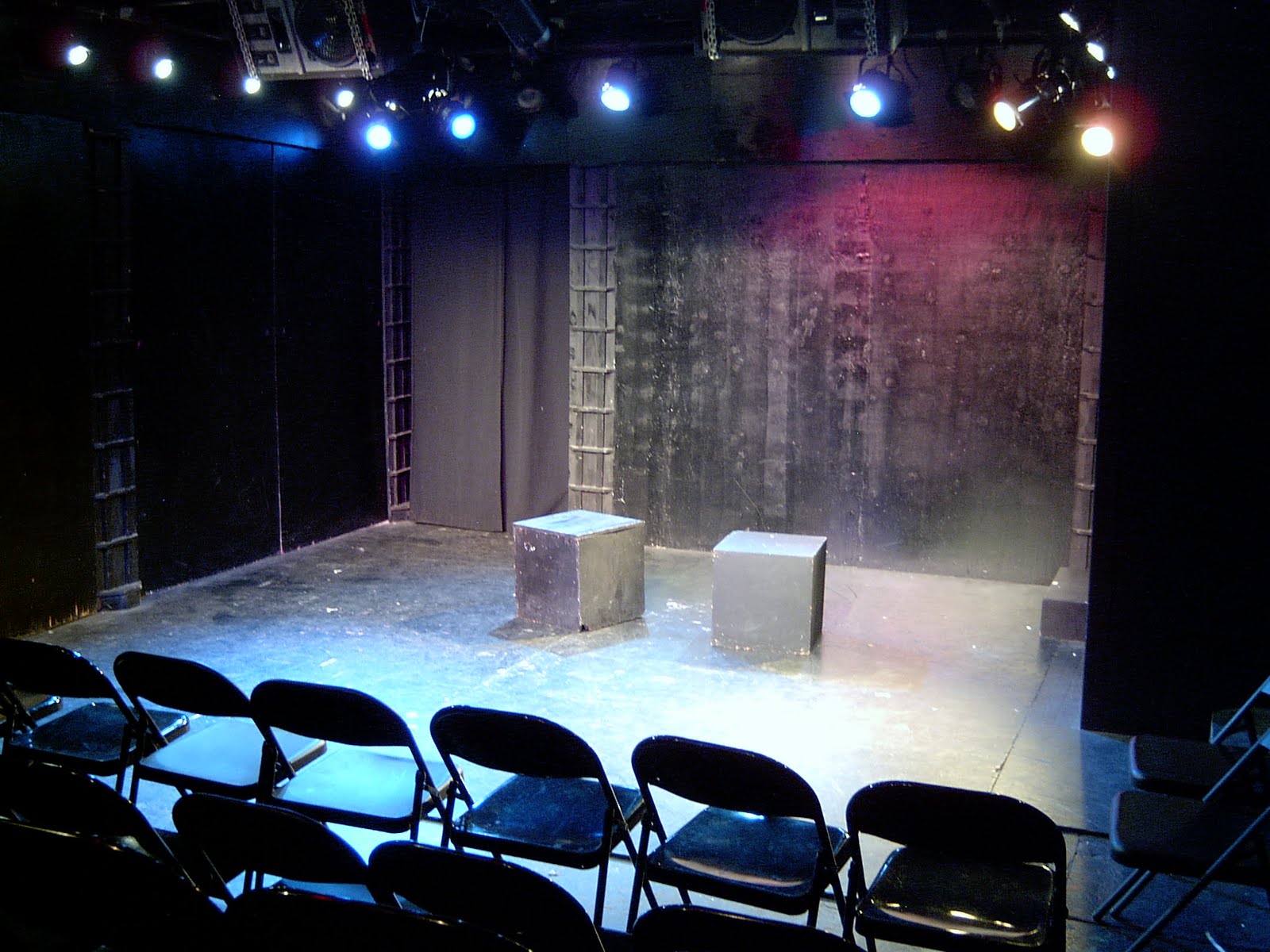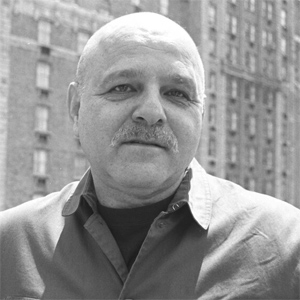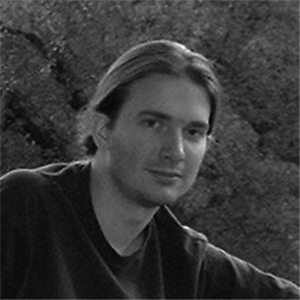| Composer's Voice Concert | ![[ Vox Novus - the new voice for contemporary music ]](http://www.voxnovus.com/img/Vox_Novus_Logo_black.png) |
| This Modern World | |
| May 16, 2004 | |
| UNDER St. Marks 94 Saint Marks Place New York, New York 10002 |
 |
This Modern World is a Composer's Voice Concert featuring the composer Eric Schwartz. Composer's Voice is a venue to express the artistry and aesthetic of the composer's "voice". |
| Title | Composers | Performers |
| Hunger | Robert Voisey | Beth Griffith – soprano electronic playback |
| Post | Eric Schwartz | Christa Van Alstine - clarinet Laura Barger - piano & Mike McCurdy - percussion) |
| Rock Star | Eric Schwartz | Christa Van Alstine - clarinet |
| We the People | Eric Schwartz | Laura Barger - piano Mike McCurdy – percussion |
| Psalmus XXIII | Noah_Creshevsky | Beth Griffith - soprano electronic playback - vocal samples by Beth Griffith |
| Jubilate | Noah_Creshevsky | Beth Griffith - soprano electronic playback - vocal samples by Thomas Buckner |
| Summer is late text by Stanley Kunitz | Benjamin Broening | Beth Griffith - voice and tape |
| Performers | |
| Pianist Laura Barger is a musician of varied interests and experiences. She holds degrees from the University of Tennessee, Knoxville (BM) and the SUNY-Stony Brook (MM), and is currently a doctoral candidate at Stony Brook. She has studied privately with David Northington and Christina Dahl, and has pursued additional studies (privately and in master classes) with Arthur Haas (harpsichord), Emma Tahmizian, Peter Takacs, Awadagin Pratt, and Leon Fleisher. She recently completed a winter term as an artist-in-residence at the Banff Centre in Alberta, Canada, where she was fortunate to work with artists such as John Perry, Nicholas Daniels, Aiyun Huang, and Edgar Meyer. Laura's interest in contemporary music has given her the opportunity to premiere a number of new works by American composers in the past two years, a trend she hopes to continue indefinitely. This summer, she will be a participating member of the Bang on a Can Summer Institute at the Massachusetts Museum of Contemporary Art. | |
|
“An extraordinary American soprano, Beth Griffith sang with a focus and presence (as she did everything) that held a listener at rapt attention. Griffith, a Texan, recently returned to the United States after a 20-year career in Germany. It is our good fortune”
--Mark Swed Los Angeles Times
Since her European debut in Mauricio Kagel’s solo theater piece Phonophonie in 1978, the demand for Beth Griffth as soloist has taken her to such important music festivals as the Warsaw Autumn, Cologne Triennale, Wien Modern, Numus Festival, RIAC, Donaueschingen Musiktage, Darmstadt Summer Courses,Wittener Tage fur Neue Kammermusik, ISCM and New Music America. In addition, her acclaimed performance of Morton Feldman’s Three Voices has been heard on numerous stages from Prague, Berlin, London, New York and in between. Recent invitations led her to Grahamstown, South Africa, Gent, s-Hertogenbosch, Cologne, Wiesbaden, Raleigh, North Carolina and here in New York with repertoire ranging from chamber works by Sorrell Hays, Dieter Schnebel, Wolfgang von Schweinitz, Manos Tsangaris, solo works by John Cage, Alvin Curran, Morton Feldman, Noah Creshevsky, John McGuire, Mattricio Kagel and Rodney Waschka. Mike McCurdy is currently a DMA candidate in percussion performance at SUNY Stony Brook, studying with Ray Des Roches, founding member of the Group for Contemporary Music. Mike has a MM from Cal State Sacramento and a BM from TCU in Fort Worth, TX. Recent performance credits include Forecast Music, The Contemporary Chamber Players (Stony Brook), The San Francisco Contemporary Music Players, The Sacramento Philharmonic, Earplay (SF,CA), and with many woefully underappreciated rock bands from Texas to California While in growing up in Canada, Christa Van Alstine spent hours dreaming of being a rock and roll goddess. After years of playing to empty chicken coops in isolated small town Saskatchewan she gave up her rock and roll dream for the more practical career of orchestral clarinetist. Christa attended the Glenn Gould School of music where they confirmed that rock and roll dreams are silly. After two years in the National Academy Orchestra of Canada, Christa moved to Stony Brook New York where she is currently working on her Masters and has been given a gift unlike any other. Today you will witness the unprecedented 'coming together' of two worlds. Thanks to master dream realizer Eric Schwartz, Christa the clarinetist will finally get to be a 'Rock Star'. |
|
| Mike McCurdy is currently a DMA candidate in percussion performance at SUNY Stony Brook, studying with Ray Des Roches, founding member of the Group for Contemporary Music. Mike has a MM from Cal State Sacramento and a BM from TCU in Fort Worth, TX. Recent performance credits include Forecast Music, The Contemporary Chamber Players (Stony Brook), The San Francisco Contemporary Music Players, The Sacramento Philharmonic, Earplay (SF,CA), and with many woefully underappreciated rock bands from Texas to California | |
| While in growing up in Canada, Christa Van Alstine spent hours dreaming of being a rock and roll goddess. After years of playing to empty chicken coops in isolated small town Saskatchewan she gave up her rock and roll dream for the more practical career of orchestral clarinetist. Christa attended the Glenn Gould School of music where they confirmed that rock and roll dreams are silly. After two years in the National Academy Orchestra of Canada, Christa moved to Stony Brook New York where she is currently working on her Masters and has been given a gift unlike any other. Today you will witness the unprecedented 'coming together' of two worlds. Thanks to master dream realizer Eric Schwartz, Christa the clarinetist will finally get to be a 'Rock Star'. | |
| Composers | |
 |
Benjamin Broening's compositions have been widely performed and broadcast across the United States and in Europe and Asia. He has written works for many media, including orchestral, choral, chamber and electroacoustic music. Recent pieces include a work for clarinet and piano commissioned by the Band and Orchestral Division of Yamaha Corporation of America for Arthur Campbell, a work for clarinet and electronics for F. Gerard Errante and a choral /orchestral work for the Connecticut Choral Society and the Grace Choral Society of Brooklyn. Other recent commissions include a cantata for the Charlotte Symphony and the Oratorio Singers of Charlotte, a clarinet concerto for the Interlochen Arts Academy Wind Ensemble, a multi-media cantata for Hampton-Sydney College, chamber works for the Virginia Glee Club, an orchestral piece for the Riccioti Ensemble (Netherlands), music for theater and dance, as well as numerous solo works for performers around the country. A recipient of the Presser Music Award, Broening has also received recognition and awards from the American Composers Forum, from the Norfolk and Bowdoin Chamber music festivals, as well as from Yale, Christs College, Cambridge, University of Michigan and the University of Richmond. His music has been recorded on the Centaur, Equilibrium and CMJ labels. Three more pieces will be released on the Centaur and SEAMUS labels in 2004. Broening is Assistant Professor of Music and Director of the Computer Music Studios at the University of Richmond. He holds degrees from the University on Michigan, Cambridge University, Yale University, and Wesleyan University. |
 |
"Imagine all the world's instruments, musicians and hemispheres lashed together into a giant mega-calliope, super-jukebox, or fantasmo-sampler. As called to action by a hyper-caffeinated virtuoso, it might sound something like these works by Noah Creshevsky."
--Arved Ashby, Gramophone Trained in composition by Nadia Boulanger in Paris and Luciano Berio at Juilliard, Noah Creshevsky (b. 1945) is the former director of the Center for Computer Music and Professor Emeritus at Brooklyn College of the City University of New York. His musical vocabulary consists largely of familiar bits of words, songs, and instrumental music that are edited but rarely subjected to electronic processing. The result is a music that obscures the boundaries of real and imaginary ensembles though the fusion of opposites: music and noise, comprehensible and incomprehensible vocal sources, human and superhuman vocal and instrumental capacities. |
 |
Eric Schwartz has studied composition at the Cleveland Institute of Music, New York University, and both the Interlochen and Aspen music festivals. Past teachers have included Margaret Brouwer, Donald Erb, Justin Dello Joio, and Randall Woolf. His diverse music background has also consisted of screaming and performance art for various metal and art rock groups, playing guitar in jazz big bands, and accompanying modern dance classes on the piano. Schwartz is currently on the faculties of New York University, Hunter College, and The Lucy Moses School. He is a founder and resident composer of the Brooklyn based experimental music group Forecast Music. |
 |
Robert Voisey has enjoyed debuts of his music all around the United States and abroad, including performances broadcasted on “Kol Muscia” (the voice of music) Israeli National Radio, the “Foldover” radio show in Oberlin Ohio, and his recent album "Dark Desert" on the "Kalvos and Damian" radio show. Recently he has had debuts: Base has been performed in Universitatea Nationala de Musica Bucuresti, Bucharest, Romania, the U.S. premier of Tears of Dew at the Artburst festival in Birmingham, Alabama, Music in Motion at the Gemeindehaus der Zionskirche in Worpswede, Germany and in Buenos Aires Argentina with La Scalar de San Telmo. As Artistic Director of the Composer’s Voice Concert Series and the 60x60 project, he strives to promote the music of his fellow composers and musicians through continual concert series. "Robert Voisey composes music as a natural part of his life…” - Noah Creshevsky |
Program Notes: |
|
Hunger (voice and playback) It is sad… sad… - Robert Voisey Post (for clarinet, piano, & percussion) So, every once in a while one composes a piece about which there is so much to say that saying nothing seems like the best course of action. I'm not particularly good at saying nothing, but I will endeavor to keep this brief. In recent years I had felt myself to be on the brink of a drastic change in aesthetic approach. Somehow, however, my pieces couldn't quite stop clinging to my past, and the great leap forward seemed like it might just be a figment of my imagination. Finally, in 2002, things began to happen. I spent many months pouring sweat and blood into a large sextet, full of abstract, and even nonsensical musical content. It was intended to be a one time experiment. But then I started my next piece. Post was the "easiest" piece I'd ever written. Much of it was composed on subway platforms, or while walking down the streets of Brooklyn. While there are a million things I could say about what it's supposed to mean, what it might mean, and what if definitely does not mean, I think I'll just let you, intrepid listener, be the judge. Rock Star (for clarinet) Rock star is an ebullient celebration of secular humanism, rock star fantasies, and goofy good times. Originally composed in 1999, it went through quite a few revisions prior to being the work you'll be hearing today. We the People (piano & percussion) Being a creative artist is often a complicated thing. It's quite easy to get so lost in one's personal creative processes that the outside world begins to seem dim and fuzzy. In the years following 9/11 and leading up to the Iraqi war, I witnessed very different reactions from my friends and loved ones. Ranging from tentative enthusiasm for the war effort to protest and demonstration, I've seen those I care about deal with the event and its aftermath in their own public or private ways. I sat back and watched, unsure how I might use my art as I became increasingly disturbed as the Bush administration began to chip away at the Constitution, ostensibly to protect the very freedoms they were looking to dismantle. It was after reading Alisa Solomon's Village Voice cover story, "Things We Lost in the Fire" (Sept. 11-17 2002) that I was finally able to find my voice. In attempting to compose what was more or less a "protest" piece, I felt it important to present not a furious argument, but rather a conversation. "We the People" is my sappy love letter, angry protest song, flashing neon joke, and cautionary tale, all dedicated to my crazy, wonderful, just-plain-dumb country. Special thanks to Vox Novus, and my wonderful performers, without whom none of this would have been possible. – Eric Schwartz Psalmus XXIII (voice and playback) Jubilate (voice and playback) Psalmus XXIII, using the vocal samples of Beth Griffith and Jubilate, using the vocal samples of Thomas Buckner, are both written in Creshevsky’s aesthetic, Hyperrealism. Hyperrealism is an electroacoustic musical language constructed from sounds that are found in our shared environment ("realism"), handled in ways that are somehow exaggerated or excessive ("hyper"). Fundamental to hyperrealism is the expansion of the sound palettes from which music is made. Developments in technology and transformations in social and economic realities have made it possible for composers to incorporate the sounds of the entire world into their music. Essential to the concept of hyperrealism is that its sounds are generally of natural origin, and that they remain sufficiently unprocessed so that their origin is perceived by the listener as being "natural." Since the sounds of our environment vary from year to year, generation to generation, and culture to culture, it is impossible to isolate a definitive encyclopedia of "natural" sounds, but there are a great many sounds that are familiar to nearly all of us. These are the most basic building blocks in the formation of a shared (if temporary) collective sonic reality. Hyperrealism celebrates bounty, either by the extravagant treatment of limited sound palettes or by assembling and manipulating substantially extended palettes. Summer is Late (voice and playback) Touch Me - Stanley Kunitz Summer is late, my heart. Words plucked out of the air some forty years ago when I was wild with love and torn almost in two scatter like leaves this night of whistling wind and rain. It is my heart that's late, it is my song that's flown. Outdoors all afternoon under a gunmetal sky staking my garden down, I kneeled to the crickets trilling underfoot as if about to burst from their crusty shells; and like a child again marveled to hear so clear and brave a music pour from such a small machine. What makes the engine go? Desire, desire, desire. The longing for the dance stirs in the buried life. One season only, and it's done. So let the battered old willow thrash against the windowpanes and the house timbers creak. Darling, do you remember the man you married? Touch me, remind me who I am. |
|
The mission of Vox Novus is to promote contemporary composers and their music via concert performances, recordings, publishing, and publicity on the Internet. Vox Novus believes strongly in the intrinsic value of contemporary music, recognizing it as a force in the advancement of culture and art. We help keep it alive through the promotion and dissemination of the music of contemporary composers. Our goal is to broaden the channels of new music between composer and public, providing greater exposure to new music. New music has always been stigmatized, yet all musical masterpieces at one time were considered new music. Vox Novus understands that without the creation of challenging, contemporary music there will be no future masterpieces to reflect our time. Exciting new works of art are coming forth constantly, and must be heard in order for the cycle of creativity to be complete. Vox Novus gets the music heard: in concerts, over the radio, on CD’s, and on the Internet. While throughout the ages artists have struggled to create their art, one may argue that artists have never been more precarious than they are now. Today’s economic climate is competitive, and emerging composers inevitably act as their own writer, producer, publicist, agent, and sometimes performer. This is a daunting array of tasks, one that unfortunately crushes the attempts of many composers who are simply not adjusted to the present environment. Vox Novus empowers the composer to promote, expand, and advance their career. Perceiving that the most important corollary to a completed work is a performance, Vox Novus generates concerts. In these concerts we develop audiences that include yet extend beyond the bounds of the musical community, broadening the audience base by familiarizing it with certain works in repeat performances, while continuously integrating new composers into the repertoire. Vox Novus helps to fill the many roles required to promote and produce contemporary music while simultaneously teaching composers how to do it themselves. We accomplish this by providing the composer with a web page, putting on Composer’s Voice concerts, and encouraging composers to create and foster audiences. Vox Novus publicizes concerts with e-mail announcements, postings on the web, mailings, flyers and word of mouth communication. At our Composer’s Voice concerts, we encourage communication and feedback through formatted discussion between composer and audience, and also through commentary cards. This provides the composer with important insight into their work and gives the audience a feeling of power and a relation to contemporary music. Vox Novus takes a creative approach to the problem of joining the audience and composer of electronic music. This is the 60x60 project, an annual concert event featuring 60 seconds of electronic music by 60 different composers, creating a CD as the material and product of the concert. In this way composers gain a maximum degree of exposure while audiences enjoy a highly interesting and palatable product. The project was inaugurated in 2003. In the future Vox Novus aims to incorporate visual artists, thereby making this a multi-media event and broadening the audience base by cross-pollinating with other artistic mediums. The Website is another important vehicle in the promotion of contemporary music. Since 2000, our website had provided over 100 composers and musicians with a place on the web, a vital tool of survival in the modern day. This allows composers and musicians to post their bios, list of works including bandwidth for listening and down-loading, availability, publish scores, and advertise their up-coming Vox Novus concerts. With our website attracting over 300 visitors a day, our Composer’s Voice concerts running throughout the concert seasons, and our annual electronic concert, 60x60, gaining increasing momentum, we at Vox Novus work hard to promote contemporary music. Our heart lies in the music. |
| Brought to you by | |||
 |
 |
||
| Funding by | |||
 |
|||
| Funding also provided by the Puffin Foundation, "...continuing the dialogue between art and lives of ordinary people." | |||
| Home | ||||||||||||
| Calendar | ||||||||||||
| History | ||||||||||||
| Opportunities | ||||||||||||
| Vox Novus | ||||||||||||
| Site Map | ||||||||||||
| Contact | ||||||||||||
| Hosted by Malted/Media and Kalvos & Damian's New Music Bazaar | ||||||||||||
![[ Vox Novus - the new voice for contemporary music ]](http://www.voxnovus.com/img/Vox_Novus_Logo_black.png) | ||||||||||||
![[ Composer's Voice ]](http://www.voxnovus.com/img/Composers_Voice_Collaboration_Logo.png) | ||||||||||||